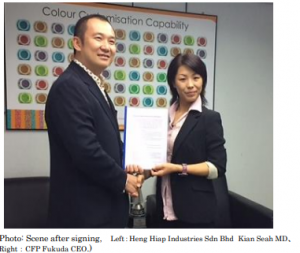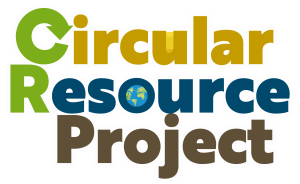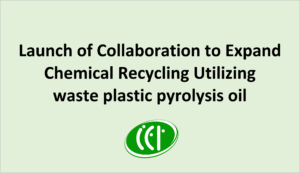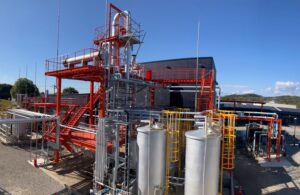CFP Corporation (referred to below as “CFP”) entered into a contract to supply Waste
Plastic-to-Oil Plant with Heng Hiap Industries Sdn Bhd(Managing Director:Kian Hoe Seah)
on September 3rd. This marks the second major overseas project for CFP since its agreement
with the Japan International Cooperation Agency(JICA)to work on demonstrating and
expanding waste plastic-to-oil processing technology in Cape Town, South Africa, and is
the company’s first export of waste plastic-to-oil plant to an overseas private enterprises.

Through the sale of plastic-to-oil plant to a Malaysian company, CFP will have its latest pyrolysis
technology operating in the 3 regions of Japan、Africa(South Africa)、East-South Asia(Malaysia), and will continue to work on the expansion and spread waste plastic-to-oil systems in its effort to expand
globally.
CFP has also received support for this effort from Hiroshima Prefecture’s Environmental Business
Cluster Support Project, and after conducting numerous investigations into the local conditions, as
well as holding negotiations with Malaysian companies, was finally able to enter into the
aforementioned contract.
CFP has been involved thus far in the recycling of plastic materials, but has now entered the high
added-value area of waste plastic-to-oil chemical recycling in order to challenge itself further. As one
method of resolving the environmental energy issues faced in the recent era and as a result of
changes in the environment, the effective use of waste plastic can both create new sources of fuel
(recycled oil), while also reducing the volume of waste material produced.
CFP’s plastic-to-oil processors are able to efficiently produce recycled oil without the need to separate
out the different main plastics, polypropylene (PP), polyethylene (PE) and polystyrene (PS) , used in
typical households, etc. As energy costs continue to rise, oil produced using waste plastic, which can be utilized in diesel engines and as fuel for boilers, can serve as a replacement for diesel fuel and
crude petroleum. In addition, fuel produced using this process also creates much less CO2 when
compared with the amount produced through incineration of waste plastics. CFP receives a large
number of requests for its plant from both domestic and international organizations searching for
an effective and sustainable chemical recycling method.







